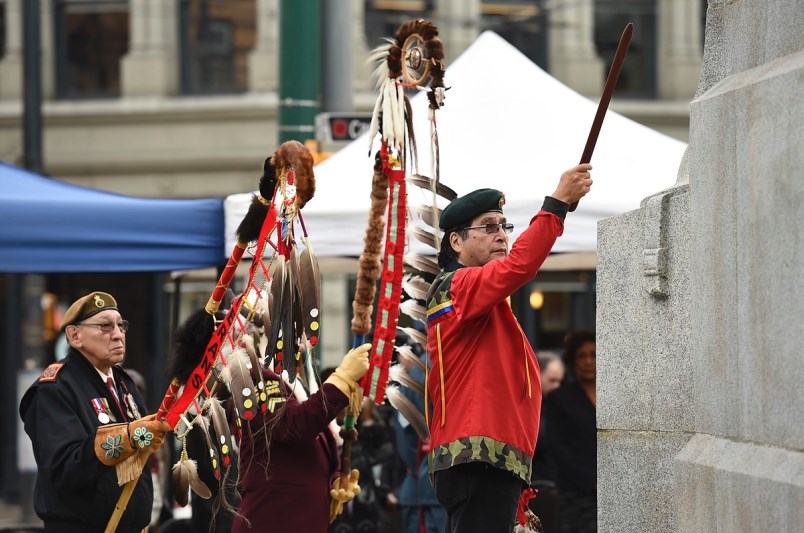There’s a saying that comes to mind when Squamish Nation veterans knowledge keeper Robert Nahanee is asked about the sacrifices Indigenous people have made for Canada.
“We are still alive. We are still on the land,” he said, referring to a message that dates back to 1906, when B.C. First Nations chiefs travelled to England to seek an audience with King Edward VII to proclaim their inherent rights.
While the meeting did not bring about change at the time, Nahanee said the message had lived on as Indigenous people continued to fight for their rights and enlisted in wars to “protect their freedom and this great nation of Canada.”
“Today, I still hear our veterans say those words,” he said.
Nahanee took over the role of the nation’s veteran knowledge keeper back in 2005 from his uncle, James Patrick Nahanee, who served in the Second World War, to ensure the contributions and sacrifices Indigenous veterans and their relatives made are never forgotten.
“When he passed the torch to me – he said, ‘You’ve got to do this. We need a representative for the Aboriginal and First Nations veterans,” the 74-year-old said.
This Remembrance Day marks the 75th anniversary of the end of the Second World War. Across Canada, at least 3,000 First Nations members – including 72 women – enlisted, as well as an unknown number of Inuit, Métis, and other Indigenous peoples, according to Veteran Affairs Canada. It’s said the actual numbers were much higher. Nahanee explained that many Indigenous people who couldn’t enlist in Canada went to the U.S to do so instead.

On Sunday, Nahanee, fellow veterans and members of the Squamish, Musqueam, Tsleil-Waututh and Tsawwassen nations gathered at a small ceremony, with COVID precautions, in downtown Vancouver to honour past and present veterans for Indigenous Veterans Day.
Nahanee who co-founded the Vancouver ceremony, said it gave the community a chance to “thank and appreciate what our Indigenous veterans have done for us. Especially the ones that didn’t come back.”
As knowledge keeper, Nahanee now holds onto the memories and messages of his two uncles who enlisted, and other veterans whose paths he crossed over the years.
James, known by many as Jimmy, enlisted in the Royal Canadian Army, joining Princess Patricia’s Canadian Light infantry on Nov. 13, 1943 at the age of 18.
Nahanee said Jimmy was following in the footsteps of his older brother Eddie, who joined the U.S. Army. Sadly, Eddie died fighting in Mariadorf, Germany, on Feb. 28, 1945. His body was later returned to North Vancouver and laid to rest at the Eslhá7an cemetery. An article by The Native Voice, published in 1949, remembered Eddie as “a warrior who was twice decorated for bravery on the battlefield and gave his life for freedom fighting under the American flag.”
Nahanee said Jimmy would go on to serve in England, France, Belgium and Holland. An experienced hunter, he advanced quickly and was promoted as a corporal and small arms instructor in Belgium.
“I recall him talking to me about the reason why he went, and he said traditionally in our Aboriginal teachings according to Squamish people, if someone needs help, we go and help. That’s what he was thinking about when he signed up,” Nahanee said, highlighting his uncle was decorated with four medals for his service.

While many made great sacrifices overseas, Nahanee said it was important to remember the battles Indigenous veterans faced when they returned from the war, explaining they not only fought for their rights as veterans, but to change the 1885 Potlatch Law that forbid Indigenous peoples from participating in any ceremony – traditional, cultural or spiritual – and speaking their own languages.
“This was the time it came out that they weren’t being treated as equal to other veterans,” Nahanee said. “They said this imbalance of rights has to be changed.”
Nahanee said a “change in the world” was seen in 1949.
“They started addressing those issues,” he said.
“By the time 1951 came, they changed the law. That’s when our people started recovering, reclaiming and reusing traditional and cultural ceremonies that were taken away.
“They wanted freedom of choice and recognition of who we are as a people. That’s what our veterans gave us.”
Nahanee witnessed the brutalities of war as a veteran himself, serving with Canadian Forces from 1963 to 1977. He served with the North Atlantic Treaty Organization Forces in Germany, United Nations emergency services in Egypt, and the Allied Command Europe Mobile Force in Norway, as well as various postings in Canada.
He said he’d always worked hard to pass on the teachings of his elders, including his uncle Jimmy, who passed away in 2012, about the importance of finding peace, through his work as a councillor for men’s domestic violence groups and as a Correctional Service of Canada spiritual adviser.
“My uncle Jimmy, he always told me you don’t need to fight. You can do things in a loving and kind way – that’s the kind of person that he was,” Nahanee said.
He said he taught people to be of "one mind, one heart."
"In other words, if we all work together, everything will come together as one," Nahanee said.
“That’s our goal, to bring that to the people. That’s what the veterans talked about.”
Elisia Seeber is the North Shore News’ Indigenous and civic affairs reporter. This reporting beat is made possible by the Local Journalism Initiative.




